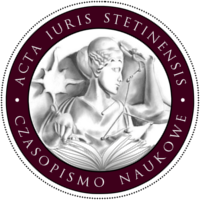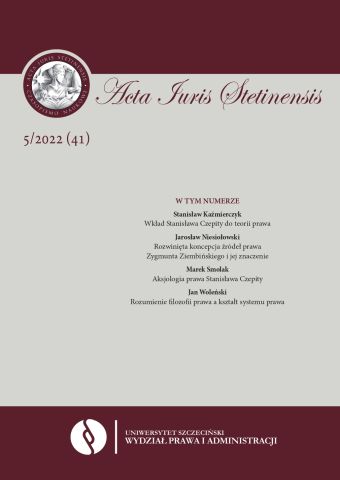







| Authors: |
Piotr
Szreniawski

Uniwersytet Marii Curie-Skłodowskiej w Lublinie |
| Keywords: | lawmaking learning theory pedagogy state |
| Data publikacji całości: | 2022 |
| Page range: | 11 (123-133) |
| Downloads ?: | 76 |
| 1. | Antón Á., Legal Design Thinking and Legal Visualization: Towards an Understandable Tax Law, Edunovatic 2020: Conference proceedings: 5th Virtual International Conference on Education, Innovation and ICT, Red de Investigación e Innovación Educativa, Madryt 2020. |
| 2. | Haładyj A., Luki konstrukcyjne w prawie ochrony środowiska – wykładnia i stosowanie, „Studia Prawnicze KUL” 2018, nr 3. |
| 3. | Jelonek B.A., Idea umowy społecznej, Acta Erasmiana VI, Ze studiów nad prawem, administracją i ekonomią, t. VI, Wrocław 2014. |
| 4. | Kaczyńska E., The Indo-European Origin of Latin Lex, „Habis” 2013, nr 44. |
| 5. | Kaim A., Design Thinking w kulturze –myślenie projektowe krok po kroku, Gdynia 2019. |
| 6. | Kapetanović A., Obraz sprawiedliwości w języku chorwackim, „Etnolingwistyka. Problemy Języka i Kultury” 2020, nr 32. |
| 7. | Karnavas M.G., Lawyer’s Ethics, Skopje 2016. |
| 8. | Klus-Stańska D., Konstruktywizm edukacyjny – niejednoznaczność, kontrowersje, dylematy, „Problemy Wczesnej Edukacji” 2020, nr 4. |
| 9. | Kruse K.R., Getting Real About Legal Realism, New Legal Realism and Clinical Legal Education, „New York Law School Law Review” 2011, nr 56 (12). |
| 10. | Kurcz I., Pamięć. Uczenie się. Język, Warszawa 1992. |
| 11. | Luhn A., The Learning Organization, „Creative and Knowledge Society” 2016, nr 1. |
| 12. | Łuszczyńska M., Umowa społeczna jako fundament życia zbiorowego, „Studia Iuridica Lublinensia” 2014, nr 21. |
| 13. | Meuwese A., Snel M., ‘Constitutional Dialogue’: An Overview, „Utrecht Law Review” 2013, nr 9 (2). |
| 14. | Sol R., Baras K., Acceptance Model in Designing for Extreme Users: Extreme Athletes Using Activity Trackers, „Journal of Image and Graphics” 2021, nr 9 (2). |
| 15. | Stanek J., Rosyjski realizm prawny, Warszawa 2017. |
| 16. | Szczepaniak P., Konteksty pedagogiki penitencjarnej, „Resocjalizacja Polska” 2011, nr 2. |
| 17. | Szpunar M., Konektywizm – (r)ewolucja kształcenia w technologicznym świecie, „Horyzonty Wychowania” 2015, nr 14 (31). |
| 18. | Szreniawski P., Prawodawstwo jako uczenie się – zarys koncepcji, w: A. Matan (red.), Administracja w demokratycznym państwie prawa – Księga jubileuszowa Profesora |
| 19. | Czesława Martysza, Warszawa 2022. |
| 20. | Szreniawski P., Teoria rywalizacji hierarchii, Lublin 2020. |
| 21. | Szreniawski P., The State as a Learning Organization and Cybersecurity, „Cybersecurity |
| 22. | and Law” 2022, nr 2 (8). |
| 23. | Ursel S., Building Better Law: How Design Thinking Can Help Us be Better Lawyers, Meet New Challenges, and Create the Future of Law, „Windsor Yearbook of Access to Justice” 2017, nr 34 (1). |
| 24. | Usman E.A., Making Legal Education Stick: Using Cognitive Science to Foster Long-Term Learning in the Legal Writing Classroom, „The Georgetown Journal of Legal Ethics” 2016, nr 29 (2). |
| 25. | Wasilewski S., Przestępczość zorganizowana w Polsce po 1989 r. – Pruszków i Wołomin, „Świat Idei i Polityki” 2018, t. 17. |
| 26. | Wesołowska J., Prawo i emocje – synteza ruchu, „Forum Prawnicze” 2021, nr 2. |
| 27. | Yang Y. i in., Joint Representation Learning of Legislator and Legislation for Roll Call Prediction, Proceedings of the Twenty-Ninth International Joint Conference on Artificial Intelligence (IJCAI-20). |